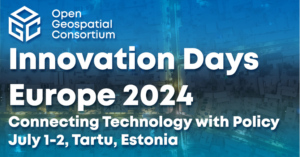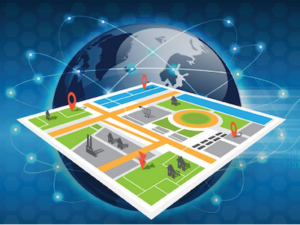Beyond Data Provision and Access – Facilitating Geospatial Data Use for Climate Resilience by Creating Spaces Where Data Ecosystem Actors Meet such as the OGC Innovation Days
 The enhanced use of geospatial data is an uncontested pillar of a more climate-resilient and sustainable future in the 21st century.
The enhanced use of geospatial data is an uncontested pillar of a more climate-resilient and sustainable future in the 21st century.
Geospatial data alone cannot solve climate resilience problems since people in governments, civil society, and the private sector are ultimately the central actors in transforming data into useful information that can improve livelihoods and lives. Yet, geospatial data is a critical input into climate adaptation policy and can help those central actors make informed and evidence-based decisions. The emphasis in promoting data is often on data production and a standard model that sees data through a supply and demand framework, which, while useful for identifying barriers, is potentially oversimplified and not capturing does not capture the nuanced roles of different actors. The current approach needs to be rethought and evolve in new directions. One starting point is understanding the data ecosystem, which is the community of organizations and individuals that engage with data, the data assets with which they interact, and the rules and structures that govern their interactions.
With the central theme being the connection between technology and policy, the Open Geospatial Consortium (OGC) Innovation Days co-organized with FOSS4G Europe in Tartu, Estonia on the 1st and 2nd July 2024, is a space where important actors in the geospatial data ecosystem meet.
It aims to foster critical discussions between experts, policymakers and other stakeholders on climate and health data spaces, enhancing resilience through interoperable and sustainable collaborations with the aim of bridging between advanced digital collaborative solutions and practical applications for policymakers.
This is achieved by focusing on the integration of Disaster Resilience, Data Spaces and One Health as key pillars for resilience. The event is rolling out the international visions on how to realize digital transformation co-designed by software and data experts, environmental scientists, and policy makers – fostering an enriching exchange of knowledge. Attendees will explore in-depth stakeholder needs and interact with the latest digital collaborative solutions.
OGC Innovation Days Europe provides a platform to discuss how current technical efforts can be combined effectively with the necessary governance and policy aspects. What decision processes do we need? What agreements are required for efficient decision processes or homogeneous reporting models for, for example, Climate Change or Land Degradation Neutrality? The workshop will compile the findings of the set of sessions. It will refine the identified requirements for the dataspaces to enhance the information and knowledge exchange on scientific, technical, and policy levels. Participants will gain practical strategies for enhancing interoperability, fostering better data ecosystems, and improving how data is leveraged in decision-making.

OGC Innovation Days Europe supports the shift in IT solutions from being purely technology-oriented to a more holistic approach that better accounts for the various needs of the stakeholders. By identifying the needs of technical experts, policymakers, and end users, the event will contribute to the future direction of technological innovations, helping design operational setups rooted in efficient governance and guided by solution-oriented policy frameworks. This interdisciplinary approach will ensure that digital tools are effectively used to support Sustainable Development Goals.
During the OGC Innovation Days, the following topics will be featured:
- The public increasingly requires a collaborative, multi-sectoral, and transdisciplinary local-to-global perspective. The EU climate-health cluster actively promotes dialogue on diverse climate-induced health issues, encompassing challenges such as the transmission of zoonotic and vector-borne pathogens, coastal water pathogens, heat-related impacts, and pollution. By leveraging innovative research, the cluster aims to build awareness and advocate for evidence-based decision-making aligned with SDG 3 (Good Health and Well-Being) and SDG 13 (Climate Action).
- The United Nations Convention to Combat Desertification (UNCCD) will emphasize geospatial reporting Indicators, especially the Sustainable Development Goal (SDG) 15.3.1 Land Degradation Neutrality. This initiative will demonstrate how data collection and analysis can directly contribute to making decisions to restore regraded lands, and the challenges encountered while building standardised and optimised data infrastructures.
- The European Centre for Medium-Range Weather Forecasts (ECMWF) and the European Space Agency (ESA) will highlight the Global Stocktake, an essential process for tracking progress towards SDG 13 (Climate Action). They will present their innovative climate monitoring systems, which assess global trends and inform mitigation and adaptation strategies in line with the Paris Agreement’s objectives.
- The Location Innovation Hub will demonstrate the value of modernised National Spatial Data Infrastructures (SDIs) linked to European Data Spaces. By introducing the requirements for future systems, the hub will explore how improved SDIs can support various sectors in working towards multiple sustainability goals (SDGs).
In the context of the Innovation Days, PlanAdapt partners with OGC to moderate workshops and panel discussions and engage stakeholders, ensuring effective communication and tailored discussions around the pillars of Disaster resilience, One Health, and Data spaces. By further connecting technology with policymaking, there is a big potential to unlock essential resources and generating actionable insights, fostering resilient communities, and driving sustainable development.
PlanAdapt consistently improves its approaches to data use facilitation (read more here: Beyond Data Provision and Access – Facilitating Data Use to Enhance Climate Resilience Policies and Action and Advance Climate Adaptation Knowledge Brokering Approaches). The following projects and initiatives have provided further insights:
